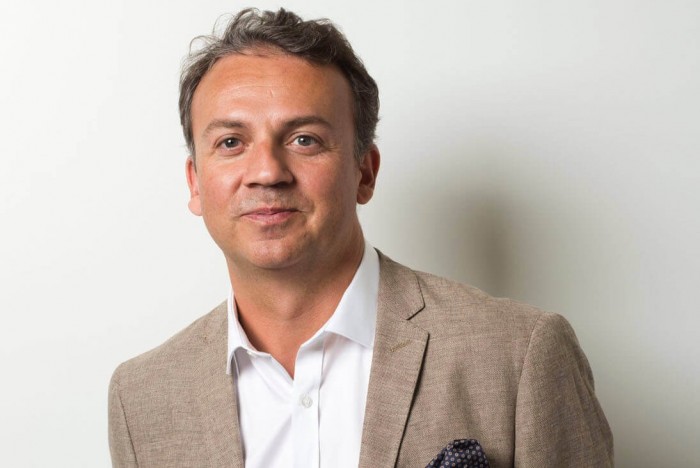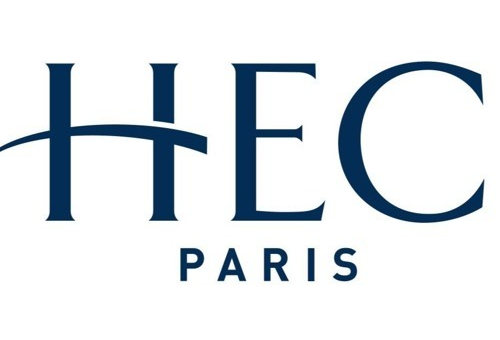Digital Innovation specialization arms MBA students with a mentality they can use for life, says Jean-Rémi Gratadour, executive director of the HEC Paris Digital Center
“Everyone is talking about innovation,” starts Jean-Rémi Gratadour, executive director of the Digital Center. “But the question is how you bring this innovation into [existing] organizations.”That’s one of the biggest challenges facing leadership in the digital age, he thinks, and one that HEC Paris aims to tackle through its new MBA specialization in Digital Innovation.
Organizations need innovation today, says Jean-Rémi, and it’s his job to ensure outgoing MBA students from HEC Paris can organize their teams effectively to implement digital strategy wherever they go.
“I joined the HEC Paris MBA with the goal of becoming a strategy consultant in Europe,” says Nikhil Deshpande, part of the MBA class of 2019.
“After speaking with consultants across countries, I realized that a critical issue affecting organizations today is the advent of digital. I wanted to supplement my profile with the requisite skills in the digital space. This is why I chose the Digital Innovation Specialization.”
The Digital Innovation specialization is one of seven MBA specializations the school offers—the others are in Sustainable & Disruptive Innovation, Advanced Management, Entrepreneurship, Finance, Marketing, and Strategy.
Real-time business projects
The first part of the specialization focuses on managing digital innovation in a B2C service; the second on managing transformation within large companies in the industrial sector.
In the first phase, students are split into groups of four or five, and work for two to three weeks on a real-time business challenge set by the executive of a partnering company.
This year, says Jean-Rémi, students worked with Japanese e-commerce company, Rakuten. Their goal was to help imagine new services that would augment the company’s B2C offering, and help it compete more in the global market.
After working with their teams for up to three weeks, each group then faces the final jury, where executives from the company grade them on their proposition.
“This year, the three best projects were direct projects the company were already working on,” says Jean-Rémi. “They are very interested in the approach of the students, bringing value to something they are already working on.”
Digital Transformation participant, Liviu Teodorescu, also part of the MBA class of 19 at HEC Paris, says he chose the program because it is very hands-on. “Working with large global companies showed real-world pain points and challenges across industries, allowing us to work together to provide realistic solutions,” he explains.
The second part of the Digital Innovation specialization teaches students about dealing with consulting within digital transformation. There is the same approach, and students again work with corporate partners on real-time projects.
All of this translates into the best approach for teaching MBAs in the digital age.
“When you are learning about technology, in two to three years everything is out of date and you have to go back to school and learn again,” says Jean-Rémi. “We focus on how to improve their ability to work together to solve problems, and how to share different skills to find a solution.
“The fact is, when you are teaching people this way you are teaching them how to use fundamental skills and improve these skills to create solutions.
“It’s an approach the students like very much, because it makes them creative and innovative, and it brings value to the company as they can present their work directly.”
World's largest startup campus
It’s not all about corporate companies on the specialization either. Students visit Station F, the world’s biggest startup campus backed by French businessman, Xavier Niel, and also the location of the HEC Paris startup incubator.
They visit the campus while students are working on creating their innovative service. Jean-Rémi explains that it helps to immerse them in an environment where creativity and innovation seep out of every pore.
HEC Paris has 75 startups in Station F. On their visit, students meet the founders of two startups who are around two years into development.
“We created this interaction because [executives] are able to teach the students about their company. After that, they ask them to make a proposition to help the startups improve their ideas,” says Jean-Rémi.
“We try to get the students to understand the process they’re going through.”
The whole specialization educates HEC Paris MBA students on the processes necessary for successful innovation implementation into a company today. The answer, then, to the question posed by Jean-Rémi at the start.
“We think when they understand the theme, they can reintroduce it whenever they need to in everyday life,” he asserts.
“If they want to find a solution to a business issue, or create a service or their own startup, or if they need to be innovative inside a company, they will know how to reproduce this innovation.”
Innovation for life
The mentality aims to serve HEC Paris MBAs for their entire careers. But, although he launched the specialization with this approach in mind, Jean-Rémi says that he has been pleasantly surprised with what he has learned from the students.
Something he says he didn’t have in mind when they launched was the direct consequence the diversity of the cohort would have on the specialization—the current cohort consists of 92% international students.
“We work in a western country and have a common vision of digital processes. When students come from all over the world you have to keep in mind that their vision of innovation and digital is linked to their cultural background,” he explains.
“It’s not just about knowledge, but about the ability to create linked to your cultural background. What came out was very impressive, sometimes really astonishing.”
Student Reviews
Cultural experience
I have met the most competent and diverse batch in this school. These people not only thrive on their own but also makes sure that you are doing it with them. The professors will take your had and walk you through all milestones and make sure you are not left behind. I have found their extracurriculars extremely engaging. There was always a room to have social life after academic life. The only hindrance is the location of the school, it is slightly outside city and living in city is expensive.
Internationality and diversity of opportunities
About my programme I would say it is very international and flexible: we have the opportunity to choose exactly the courses we want. But at the same time, the frame of the campus is crucial in students' life and enable us to create friendships.
Great selection of people
While HEC's MBA is highly selective, I really enjoy the type of people HEC's selects to make sure everybody gets the best out of their MBA experience and networking opportunities. Not only it's an incredibly diverse pool of people (~60 nationalities) but most importantly they make sure to let in friendly empathic and curious people.
Best in France for Grande ecole
A prestigious business school. Languages are important. It is better to have a scientific baccalaureate with excellent grades in high school and good assessments.
The courses are well designed as per the latest trends and practicality of learning in stressed upon. Overall, a very good experience.
Diversity and quality of fellow students
Very international and interesting place to be and opens a lot of opportunities, however the administration is very french and facilities are subpar (gym, classrooms) meaning the academic affairs is pretty much useless and lastly we are graded on a curve which can create a toxic environment because of the competition. With that being said the pros outweighs the cons by far.
The quality of the teachers, the campus, the clubs
The school is very international indeed, we have courses with international students and share things with them within the extra academic life (in the social clubs especially). We have great career prospects if we prepare ourselves well - however, the global curriculum is still very finance-oriented, which is a pity for other interesting domains of the company world, which does not rely on finance only. The social clubs are good practice for the management and for now, are quite independent.
HEC Paris awaits you
HEC Paris is really a nice place to do a master's in business. Many classes are useful and interesting (corporate finance, financial accounting, contract law…), some are less - but the curriculum is to be reviewed in the year to come. Regarding the student life, it is incredible, with about 130 clubs, lots of great parties with even greater people. The Jouy campus offers a lot of opportunities to do sports, and you can breathe fresh air every day. HEC also helps a great deal to find an internship or a job.
A dream institute
Enrolling in the HEC MBA was by far the best decision I made for myself. The people and faculty are great, with lots of opportunities to meet people and expand your horizons. Very nice campus where I have had some good running sessions.
The alumni network is superb and very helpful. It also has a good support system for entrepreneurs. Would definitely recommend it!
Good choice for a career boost
The classes were extremely practical and relevant to the current challenges that businesses are facing. You have access to a wide range of professionals and good career prospects once you leave the university.
Cultural experience
I have met the most competent and diverse batch in this school. These people not only thrive on their own but also makes sure that you are doing it with them. The professors will take your had and walk you through all milestones and make sure you are not left behind. I have found their extracurriculars extremely engaging. There was always a room to have social life after academic life. The only hindrance is the location of the school, it is slightly outside city and living in city is expensive.
Internationality and diversity of opportunities
About my programme I would say it is very international and flexible: we have the opportunity to choose exactly the courses we want. But at the same time, the frame of the campus is crucial in students' life and enable us to create friendships.
Great selection of people
While HEC's MBA is highly selective, I really enjoy the type of people HEC's selects to make sure everybody gets the best out of their MBA experience and networking opportunities. Not only it's an incredibly diverse pool of people (~60 nationalities) but most importantly they make sure to let in friendly empathic and curious people.
Best in France for Grande ecole
A prestigious business school. Languages are important. It is better to have a scientific baccalaureate with excellent grades in high school and good assessments.
The courses are well designed as per the latest trends and practicality of learning in stressed upon. Overall, a very good experience.
Diversity and quality of fellow students
Very international and interesting place to be and opens a lot of opportunities, however the administration is very french and facilities are subpar (gym, classrooms) meaning the academic affairs is pretty much useless and lastly we are graded on a curve which can create a toxic environment because of the competition. With that being said the pros outweighs the cons by far.
The quality of the teachers, the campus, the clubs
The school is very international indeed, we have courses with international students and share things with them within the extra academic life (in the social clubs especially). We have great career prospects if we prepare ourselves well - however, the global curriculum is still very finance-oriented, which is a pity for other interesting domains of the company world, which does not rely on finance only. The social clubs are good practice for the management and for now, are quite independent.
HEC Paris awaits you
HEC Paris is really a nice place to do a master's in business. Many classes are useful and interesting (corporate finance, financial accounting, contract law…), some are less - but the curriculum is to be reviewed in the year to come. Regarding the student life, it is incredible, with about 130 clubs, lots of great parties with even greater people. The Jouy campus offers a lot of opportunities to do sports, and you can breathe fresh air every day. HEC also helps a great deal to find an internship or a job.
A dream institute
Enrolling in the HEC MBA was by far the best decision I made for myself. The people and faculty are great, with lots of opportunities to meet people and expand your horizons. Very nice campus where I have had some good running sessions.
The alumni network is superb and very helpful. It also has a good support system for entrepreneurs. Would definitely recommend it!
Good choice for a career boost
The classes were extremely practical and relevant to the current challenges that businesses are facing. You have access to a wide range of professionals and good career prospects once you leave the university.
Diverse
HEC, as an academic institution, serves as a launching pad for students to excel in their pursuits and careers. The diversity among students and professors is truly remarkable. The chance to attend seminars across five major continents is unparalleled. The exposure and relationships it fosters are invaluable.
Super diverse
It's a super diverse and fascinating environment with tons of chances, but the management is very French, and the facilities like the gym and classrooms are not great. This makes the academic side quite ineffective. Plus, we're graded on a curve, leading to a competitive and sometimes toxic atmosphere. Despite all that, the benefits definitely overshadow the drawbacks.
Surreal academic experience
What stood out to me about HEC was the direction and insight it offered on coding approaches. Prior to joining the program, I attempted self-learning, but I felt disoriented and lacked a starting point.HEC enabled me to grasp the basics of programming and provided support when I encountered obstacles. Without that guidance, I doubt I would have achieved the progress I have made to date.
Good security
HEC boasts a dedicated team of security personnel who undergo rigorous training to ensure the perpetual maintenance of tranquility and orderliness within the institution. Their unwavering efforts are directed towards fostering a sense of security among the student body, thereby enabling them to channel their energies predominantly towards their academic pursuits.
Innovative teaching method
I am thoroughly enjoying my time at HEC, from the innovative teaching methods to the welcoming campus environment, which is particularly supportive of international students. The extracurricular opportunities, such as sports and associations, are incredibly valuable. Additionally, the career services offered are exceptional. Overall, I find my experience at HEC to be truly enriching.
mim
HEC Paris has been a transformative experience for me. The caliber of the faculty, the diversity of the student body, and the global network it offers are unmatched. The curriculum is highly flexible, allowing students to tailor their learning experience to their career goals, and the focus on real-world application through case studies and consulting projects provides invaluable hands-on experience. The campus itself is beautiful, and the opportunities to engage with leading companies through internships, competitions, and networking events have been incredible. HEC truly prepares you to be a leader in today's complex business world. I couldn’t have asked for a better program to propel my career forward.
Unwavering enthusiasm
Here's the first paragraph:
I embarked on a journey to Paris, where HEC University welcomed me with open arms. As I stepped onto its prestigious campus, I was captivated by the infectious energy and innovative spirit that filled the air. The passionate faculty, industry experts, and fellow visionaries from around the globe shared their knowledge with unwavering enthusiasm."
Exceptional Experience
HEC offers an exceptional experience that I highly recommend. The small-town setting allows for a unique blend of academic rigor and community engagement. The peaceful campus and close-knit student body create a warm environment. Proactive engagement with professors yields valuable guidance. Friendships may blossom slowly, but persistence pays off. The city's beauty, scenic views, and diverse eateries near campus enrich the experience. University dining may not impress, but it's decent.
A Transformative Experience
Attending HEC Paris is an exceptional experience, combining world-class education with personal and professional growth opportunities.
The courses are incredibly engaging, delivered by highly qualified professionals who are specialists in their domains and often work or have work experience in prestigious companies. Far from being purely theoretical, the programs emphasise practical, hands-on learning, allowing students to dive deep into whichever area they want to specialise in. The variety of elective courses is remarkable - you can explore anything from advanced financial techniques to more cultural disciplines like politics, arts, and cinema.
Beyond academics, the student life at HEC is vibrant and dynamic. With over 50 student associations to join, there's something that will fit for everyone. Whether you are passionate about entrepreneurship, sports, arts, cuisine, social causes or anything else, HEC offers a space to explore and develop your interests.
The campus itself is well-equipped, providing students with everything they need for a comfortable and enriching experience. From excellent accommodations and sports facilities with professional coaching to a sprawling green area perfect for walking or relaxing, the environment is both stimulating and tranquil. And with Paris just a short bus ride away, students have the added benefit of easy access to one of the world's most beautiful cities.
However, what truly sets HEC apart is the unparalleled networking opportunities it provides. The school fosters connections through daily conferences in various fields of business (and not only business), networking events, site visits, and alumni cocktails. The alumni network is incredibly powerful, opening doors to countless opportunities and making it easier to connect with professionals in your dream field. The career center is another standout feature, offering invaluable support to help students navigate their career paths.
In conclusion, HEC Paris is much more than a top-tier European business school - it’s a transformative experience that equips you with the knowledge, skills, and connections to achieve your goals while also helping you discover what you’re truly passionate about.
Exceptional and esteemed institution
My time at HEC Paris was nothing short of incredible! The exceptional faculty, cutting-edge curriculum, and breathtaking campus exceeded my expectations. But what truly made my experience stand out was the diverse and dynamic community. I forged lasting bonds with people from all corners of the globe and gained invaluable insights from their unique perspectives.
The career prospects and alumni network that come with graduating from HEC Paris are unparalleled. I feel privileged to have been part of this esteemed institution and wholeheartedly recommend it to anyone seeking a top-tier business education.
My study Experience at HEC Bussiness School
Programs are generally tought in English and have Strong academic foundation and access to practical business knowledge.
Located in the center of Paris with good environment and professors.
But the administration is very slow and annoying.
And secondly if your financial situation is not strong than i don't think it will be a smart choice.
Very satisfied with teaching style
I chose HEC Paris for its strong sense of community. While other colleges offered identical academic degrees, HEC Paris' pleasant culture and helpful environment really spoke to me. The tough courses, competent professors, and extensive career preparation have given me a well-rounded educational experience. I would not exchange my experience at HEC Paris for anything. Given their commitment and energy, I believe they are eager to learn and engage in class. I am confident that my time at HEC Paris will prepare me for a great future, and I am pleased to be a part of it.
Everyone’s excited to be here
HEC Paris has been a fantastic experience for me, going much beyond academics! The professors are great mentors who walk us through cutting-edge principles and practical applications. We're talking about innovative ideas, industrial partnerships, and global opportunities that can help us prepare for a global future.HEC Paris achieved the ideal balance between tradition and innovation. HEC Paris strikes the optimal blend between demanding academics and a supportive community. The instructors are excited about what they teach and are always willing to help, ensuring that you do not just study but also grasp the content.
Wouldn’t change a thing
I had an incredible experience at HEC Paris. The classes are interesting, the lecturers are excellent, and I believe I am gaining a useful education. This institution's people and faculty are outstanding, and while here, I discovered my actual self. I always feel comfortable on campus because it is the safest place in town. The students at HEC Paris are unquestionably its greatest asset.All of the students are determined to succeed and have a strong passion for a variety of activities. The level of diversity you encounter is extraordinary.








